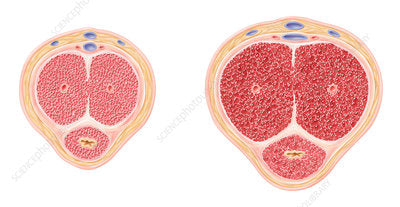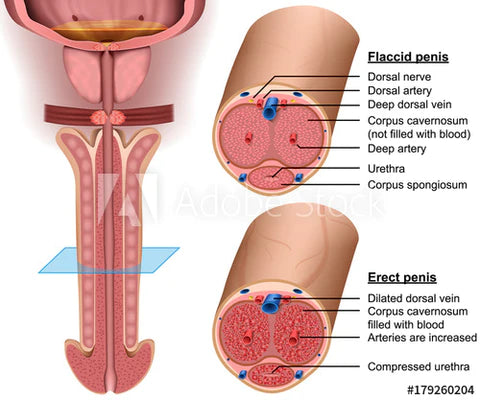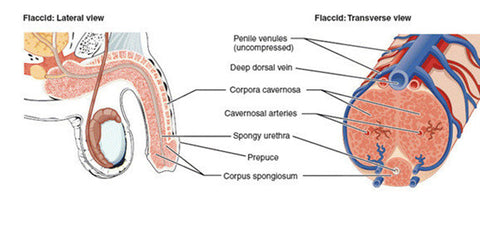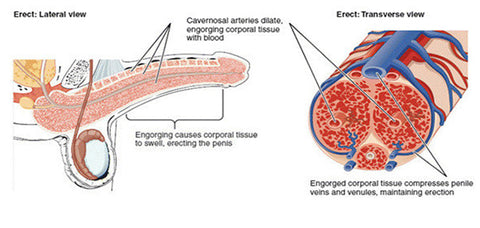The Problem
What is Erectile Dysfunction?
Symptoms
Inability of a man to achieve and maintain an erection sufficient enough for intercourse
or
It's when a man has difficulty getting or maintaining an erection long enough for sex.
In medical terms the above is known as Erectile Dysfunction or Impotency.
In common terms
Commonly
known as ED but it's not the same for everyone – it can vary person
to person (symptoms).
- Some men can't get an erection at all
- Some men get erection - But it's not hard enough for sex.
- Few men get a hard erection but lose it before or during sex.
For few any one of the above symptoms can happen once in a while – that’s the start and it's more common than you think.
The Massachusetts Male Aging Study of 1994 and other similar later studies revealed that more than 52% of all men over the age of 35 experience some degree of ED. The percentage men with this problem increases with age starting with approximately 40% at the age of 35 increasing to approximately 70% at the age of 70.
Causes
Erectile dysfunction (ED) can be caused by a variety of physical, psychological, and lifestyle factors. It's often a complex interplay of these factors that contributes to the condition. Here are some of the common causes of ED:
Physical Causes:
- Cardiovascular Disease: Conditions such as atherosclerosis (narrowing of the arteries), hypertension (high blood pressure), and high cholesterol can restrict blood flow to the penis, making it difficult to achieve and maintain an erection.
- Diabetes: High blood sugar levels can damage nerves and blood vessels, leading to ED.
- Neurological Disorders: Conditions such as multiple sclerosis, Parkinson's disease, and spinal cord injuries can affect the nerves that control erections.
- Hormonal Imbalances: An imbalance in hormones, particularly low levels of testosterone, can contribute to ED.
- Obesity: Being overweight or obese can increase the risk of ED by causing hormonal imbalances and restricting blood flow.
- Medications: Some medications, such as certain antidepressants, antihypertensives, and antipsychotics, may have ED as a side effect.
- Smoking: Smoking damages blood vessels and can lead to ED.
- Alcohol and Substance Abuse: Excessive alcohol consumption and the use of recreational drugs can impair sexual function.
- Prostate Issues: Conditions like an enlarged prostate (benign prostatic hyperplasia) or prostate cancer treatment can affect erectile function.
Psychological Causes:
- Stress and Anxiety: High levels of stress, anxiety, or performance pressure can interfere with sexual performance.
- Depression: Depression can reduce libido and lead to ED.
- Relationship Issues: Problems in the relationship, communication issues, or unresolved conflicts can contribute to ED.
- Low Self-Esteem: Negative self-perception and body image issues can affect sexual confidence.
Lifestyle Factors:
- Lack of Physical Activity: A sedentary lifestyle can contribute to obesity and other health problems that increase the risk of ED.
- Poor Diet: Diets high in processed foods, sugar, and saturated fats can negatively impact overall health and contribute to ED.
- Excessive Alcohol: Heavy drinking can impair sexual function.
- Drug Use: The use of recreational drugs, such as cocaine or marijuana, can lead to ED.
- Smoking: Smoking damages blood vessels, including those involved in erections.
Psychological and Emotional Causes:
- Performance Anxiety: Worrying about sexual performance or the fear of not satisfying a partner can lead to ED.
- Past Trauma: Previous traumatic sexual experiences or abuse can have a lasting impact on sexual function.
- Mental Health Issues: Conditions like anxiety and depression can contribute to ED.
Whats the key? How is it related?
Erections depend on proper blood flow to the penis
- When a man is sexually aroused, the brain sends an impulse telling the arteries in the penis to widen
- As a result, more blood flows to the penis
- The penis expands, hardens, and becomes erect
- But if this blood flow is restricted and is not in full capacity – it leads to erectile dysfunction.

There are several erectile dysfunction causes as listed above. Sometimes it's caused by health conditions or due to our lifestyle - “But blood flow is always important”. If blood is prevented from properly flowing to the penis, it can lead to erectile dysfunction.
Why do the above causes prevent blood flow?
Irrespective of its medical conditions like High blood pressure, Depression for which we take medications/medicines/drugs – it can lead to the hardening of the arteries and thus impacting blood flow.
Similarly, in the case of smoking, it can damage or block the blood vessels or lead to the hardening of the arteries. Any of these root causes can prevent the blood flow to the penis and can cause ED.
The Mechanics of ED
You get an erection when blood fills two chambers known as the corpora cavernosa. This causes your penis to expand and stiffen, much like a balloon as it is filled with water. Impulses from the brain and genital nerves start the process. Anything that blocks these impulses or restricts blood flow to the penis can cause ED.
Flaccid and Erect Penis

HERE'S THE BOTTOM LINE.
Erectile dysfunction is not all in your head or It's not just a part of aging that you have to accept. It's a real medical condition. So it should be treated like one. In most cases, your erections won't improve without treatment. By not seeking medical help for erectile dysfunction or impotence, millions of men are causing unnecessary damage to their most important relationships.
Fortunately, misperceptions about ED are changing rapidly, and never before has there been such a choice of treatments available.


